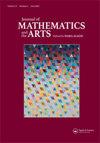空心中的怪物:用德布鲁因的怪物定理计算奈基编织图案
IF 0.2
Q4 MATHEMATICS, INTERDISCIPLINARY APPLICATIONS
引用次数: 0
摘要
日本的麻花辫(Naiki)以其中空的内部结构而著称,其结构简单,与许多其他纤维工艺品一样。这种结构形成圆柱形辫子的方式在最终产品上施加了一套特殊的对称性。本文利用列举组合学,包括德布鲁因的怪物定理,利用这一自然对称集来计算等值下的双色奈基辫的个数。图形抽象本文章由计算机程序翻译,如有差异,请以英文原文为准。
Monsters in the hollow: counting Naiki braid patterns using de Bruijn's Monster theorem
ABSTRACT The Japanese braids known as Naiki, which are distinguished by their hollow interior, have a simple structure shared by many other fiber arts and crafts. The way in which this structure forms a cylindrical braid imposes a particular set of symmetries on the final product. This paper uses enumerative combinatorics, including de Bruijn's Monster Theorem, to count the number of two-color Naiki braids under equivalence by this natural set of symmetries. GRAPHICAL ABSTRACT
求助全文
通过发布文献求助,成功后即可免费获取论文全文。
去求助
来源期刊

Journal of Mathematics and the Arts
MATHEMATICS, INTERDISCIPLINARY APPLICATIONS-
CiteScore
0.50
自引率
0.00%
发文量
19
 求助内容:
求助内容: 应助结果提醒方式:
应助结果提醒方式:


